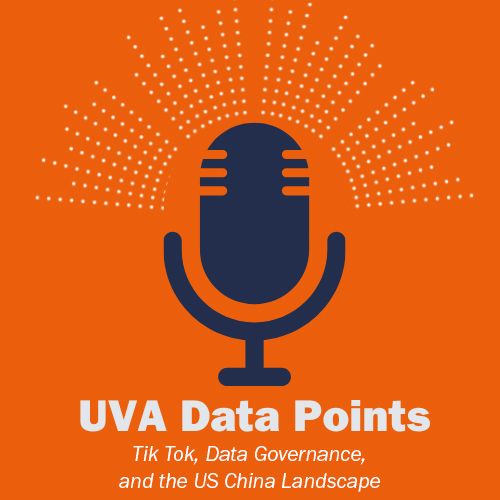Episode Transcript
Monica Manney
Welcome back to UVA data points. I'm Monica Manney. Today's episode was produced in conjunction with Gia Smith, a PhD student at UVA School of Data Sscience. And so Gia will actually be your host. She also conducts the interview for this episode. And so with that, here's Gia Smith.
Gia Smith
Hello. My name is Gia Smith. I am currently a PhD student here at the University of Virginia in the School of Data Science. During this academic term, I had the opportunity to study the ethical considerations surrounding data policy, specifically as it pertains to the popular technology platform TikTok and its ongoing concerns regarding data privacy and sovereignty. In this episode, we're thrilled to have Dr. Aynne Kokas a CK Yen professor at the Miller center, and an associate professor of Media Studies at the University of Virginia. Dr. Kokas's research examines Sino US media and technology relations. Dr. Kokas is also the author of the critically acclaimed book, Trafficking Data: How China is Winning the Battle for Digital Sovereignty. We will also touch on a few topics that we're discussing her recent conference at the Miller center, titled US China Tech Competition: Has Democracy Met its Match? During the event, Dr. Kokas and other experts discussed a variety of issues related to the ongoing tech competition between the US and China. For example, they explored the ways in which apps and other technology platforms may be used by the Chinese government for data gathering purposes, and examine potential policy responses to the increasingly complex data flows between the two countries. Additionally, they discuss the long term stability of us technology infrastructures, and its implications for national security. In addition, there are panels that discuss the digital economy, climate, tech, infrastructure, and political influences between China and the US. Today, we'll be discussing data policy for US China technology, a topic that has become increasingly relevant in recent years as the two countries continue to compete for dominance in the tech industry. We'll delve into the differences and approach to data policy between China and the United States, the implications of these differences, and how China's digital Silk Road initiative is expanding its influence over the global digital economy. We'll also discuss the challenges of balancing economic benefits against concerns about national security and human rights and the future of the technology industry in light of these trends. With that, I introduce Dr. Aynne Kokas. My first question is, in your book, you define digital sovereignty in great detail. But can you explain for us digital sovereignty and how China's winning the battle for it?
Aynne Kokas
So one of the things that's really interesting about our contemporary world is the fact that we see this new landscape of what countries can control and how they can exert their sovereign power. And one of the things that we see in China's engagement with the world more broadly, is an effort to kind of extend the bounds of sovereignty in areas where, where borders are a little bit squishy. Now in a Chinese context, essentially, all data that's generated by Chinese nationals or by Chinese companies, is considered part of China's digital landscape. Also, any national, any percent perceived violations of national security, which occur digitally, globally, can be tried under Chinese law, in, in the PRC, and in Hong Kong. Now, this is very different from a US context where we, we don't even talk about these ideas of digital borders, in the European Union in Japan, and Korea, and Australia and India, there are kind of middle grounds to all of these. So in the US, we don't really talk about digital borders at all. In China, basically, anything that pertains to China at all is part of China's digital sovereignty, or cyber sovereignty as the Chinese government translates it. And then countries like Korea or Japan, or regions, like the European Union, have a middle ground where there are some areas that are part of that digital sovereignty, part of the digital borders of, of that country or region, and other areas that are allowed to be that flow globally.
Gia Smith
So my next question is, as we continue to explore the complex world of technology and global politics, it's important to consider the role that cultural and societal differences play in shaping data policy, and the development of technology. In the case of the United States and China, these differences are particularly significant given the unique histories, values, and political systems of each country. On one hand, the US has long championed free speech, individual rights, and an open Internet, which has led to a thriving tech industry that values innovation and entrepreneurship. On the other hand, China's approach to governance, and its emphasis on social stability has resulted in a tightly controlled internet and a tech industry that is closely linked to the state. These just, these differences in values and political systems have significant implications for data policy and the development of technology in each country. In your research, what other cultural and societal differences between the US and China stand out to you the most regarding data policy and the development of technology.
Aynne Kokas
So one thing that really strikes me is differing levels of trust in the government. And so this is a really interesting case where within the US context, people tend to be much more comfortable trusting their data with with corporations than with the US government. By contrast, within a Chinese context, there is a much, much more trust in government data gathering. And the idea that the government would use user data in, in the interests of society. Now, this has shifted a little bit there has been an erosion of this trust, particularly during the COVID lockdowns and the ways in which health codes were used to track people and limit their movement and lock them down. So it's to be seen how this plays out over the long term. The other thing that I think a lot of people don't realize is that within a Chinese context, there's actually a lot more user data protection for individuals from corporations, also kind of reflective of this difference. So the Chinese Personal Information Protection Law, for example, offers much more protection for users to have from having their data extracted from, from platforms than any users would have in the US. So we currently have no national data privacy regulations that cover all sectors.
Gia Smith
And that actually leads into my next question, the MIT review revealed in August of 2020, that large datasets can reveal patterns and trends in human behavior, like you said, which helped the CCP, or the Chinese Communist Party, with the intelligence and propaganda as well as surveillance. Some critics of China's Data Policy argue that it relies on censorship and surveillance to maintain control of its population. Do you agree with this assessment? And if so, what are the implications for both China and the rest of the world?
Aynne Kokas
I don't think it's particularly controversial to make the argument that the Chinese government relies on surveillance to manage its population. So the question is, and actually, in some ways, this is presented as a net positive. So for example, in the city of Shanghai, there's a city brain that actually surveilled the population, and manages things like pothole replacement, or drainage and traffic. And these are actually forms of surveillance that are pitched to to locals as a way to actually enhance municipal management, and to, to embed it to improve how the city functions. Now, the challenge becomes when we move into things like surveillance in areas like law enforcement, or differential surveillance of different ethnic groups, or different minority groups, like we see in Xinjiang, or as we saw in the case of COVID zero where people who have historically benefited from these systems of surveillance and and municipal management are on the wrong side of them, where they actually feel themselves constrained where they feel their movement is limited, because of the kind of massive surveillance apparatus. So this is a so I think that it's a it's a double edged sword. And one of the things that we see is in China's export of a lot of surveillance equipment, there is this effort to kind of sell these tools as ways to improve the management of particularly developing countries.
Gia Smith
And your book, you discuss the role of Chinese tech companies in shaping Global Data Policy. Can you elaborate on this and how it affects the US China technology relationship?
Aynne Kokas
So this is really an interesting case. So for example, in the the ITU at the UN, the United Nations, the International Telecommunications Union, this is an organization that is heavily involved in setting standards for a wide range of new technologies. Now, one of the things that's really interesting here is that if in order to set a new standard for, for a technology, you actually have to be able to share that technology with the ITU and you have to be willing to share that technology. Now, in a highly competitive environment, like in the US context, there's not a lot of willingness to share technologies that are not that are not yet ready for market in advance of that because of concerns about IP theft. Within the Chinese context. A lot of Chinese firms have monopolies in their areas where they've been heavily government supported. So in an effort to advance China's influence over tech standards, the Chinese government urges Chinese firms to actually share their plans and their emerging IP, with organizations like the ITU in order to essentially set the rules of the road for the future of new technologies. So this is particularly noteworthy in a facial recognition context, but there are a lot of other examples as well.
Gia Smith
So I did want to pivot a little bit and talk about your the conference that I attended, that you hosted. In your book, as well as during the discussion of the tech competition and social media at your recent conference titled US China tech competition, has democracy met its match?, you've talked about how the US government and tech giants play a huge role in the insecurity of set its citizens data privacy. At the conference, we even discuss how many American stakeholders and Chinese tech companies are not held accountable. Given this complex landscape. What steps do you think the US government and tech industry should take to address these concerns and better protect the privacy and security of American citizens data? And how do you see this issue intersecting with larger geopolitical competition between the US and China and the tech industry?
Aynne Kokas
So one of the things that I think this underscores is that well, a lot of regulation and a lot of discussion, and Congress focuses on all of the damning things or all the dangerous things that the Chinese government is doing, what really our focus should be, is on protecting and preserving the US information environment, not just visa vie Chinese companies, but also relative to American firms and American investors. So enhancing data protections for everyone, regardless of which company they regardless of which country, that country... sp something like protecting data protecting, protecting data for everyone, regardless of the country that that company comes from looking at the ways in which countries actually, companies actually use user data, it's also important to pay more attention to the types of companies that investors are investing in now, this is a huge issue. And it's also one that really speaks to a lot of entrenched competition in values of the US. One is the focus on national security. Another is this, you know, rapid growth of capital and enhancing shareholder value. So these are two kind of fundamental questions that are coming up against one another. And as a result, it's very difficult to have any forward movement in lawmaking because of, you know, trends, entrenched lobbying interests and trenched financial interests. So I don't think that there's an easy answer. But one of the things that I do think is really important, and one of the reasons why I wrote the book is that I think, especially young people need to become involved in these debates, because it is shaping the rules of the road for the future of your lives in ways that are much more significant than they are for people who are 20, or 30, or 40 years older than you.
Gia Smith
Very true. I do want to push back a little bit, because you did say it was a bit more difficult to try to express, but I wanted to ask, because I get this question a lot. If there are a lot of US stakeholders that continue to invest in Chinese tech firms, despite the risk of these firms being subjected to review by the CCP for possible data collection. Why did they continue to invest? I'm curious to hear your perspective.
Aynne Kokas
So that's a great, that's a great question. And one thing that I one thing I do want to highlight is in a lot of discourse, there's there's a kind of movement back and forth between the CCP and the PRC, so the communist, the Chinese Communist Party and the People's Republic of China. And I think it is really important to talk about the PRC, the country, rather than the CCP, because China is, even though it is a one party state, I think it's important to make that distinction because it also kind of legitimizes the government of China, when we talk about just the party, it makes it seem it both is a bit more inflammatory. And it can make it seem like China is a less legitimate country. So I really want to emphasize that when we talk about this, it's important to talk about the People's Republic of China. Now, when we're thinking about these kind of long term questions of how investment works, and how we might want to continue along that path. I think it is, there are a lot of reasons why companies continue to invest. And a lot of that has to do with the pressure that they have from their investors in the US to increase shareholder value and being in China is one way to do that. Now that's less the case now it because increasingly, the data governance frameworks in China as well as other laws related to foreign investment, make it difficult for foreign companies to operate there. But where, and we haven't completely met the tipping point yet, we kind of had haven't hit that tipping point. But we are close. We are close to a point where investors are really starting to have to think about this. And in fact, actually, just today got a got a series of questions from a journalist on these specific issues about a specific industry that may actually have to pull out of China because of new data protection laws. So this is a very active barrier.
Gia Smith
I definitely understand. So you've written about the Chinese digital Silk Road Initiative, which aims to expand Chinese influence over the global digital economy. Can you tell us more about this initiative and how it fits into Chinese broader strategic goals.
Aynne Kokas
So the digital Silk Road is part of a larger initiative, a larger, larger trade and investment initiative called the Belt and Road Initiative. And that is a Global Strategic Investment Initiative to expand China's trade, trade involvement in a wide range of different countries. Now, if you're interested in learning more about the belt, the Belt and Road Initiative at the East Asia center that I direct, we have a lot of talks that we have archived about the Belton Road initiative on our website, so I'd urge you to check those out. Now, the digital Silk Road is essentially creating the rules of the road in different countries. So installing Chinese tech, establishing technical standards, building new infrastructure, along the lines of the Belton Road initiative, but focused primarily on digital infrastructure and technology.
Gia Smith
As someone who studied the intersection of technology and global politics, what do you think are the most important trends or issues to watch in the coming years?
Aynne Kokas
So one thing that really strikes me is the, is the emergence of different AI technologies and the differing standards that we have in different countries, and the fact that there really is not a big move to for any kind of convergence and standards, I think a general fragmentation and data governance is also really significant. And finally, I think that looking at issues of climate and the intersection of climate change and new digital technologies, which either can help and maybe help make our world more efficient, or can suck huge amounts of energy, if we look at something like blockchain that we're becoming more reliant on, but is a huge energy hog. So this is a this is a really interesting question in terms of how we manage the wide range of environmental issues that are coming down the pike.
Gia Smith
And how can consumers and individual users protect their data and privacy in a world dominated by large tech companies and government surveillance? And the funny question that I do have is, should we all delete the app TikTok and apps like it from our devices?
Aynne Kokas
So this is a really tough one. Because in some ways, it's part of like, this type of question is part of the problem, where we, and where in my book, I talk about how when we treat these collective issues of data gathering, gathering and surveillance and integration as individual issues where it's essentially just something that we need to manage on our own, it's very much like the playbook that the energy industry used for climate change, where it's not about the ways that they change how they do their business, it's about you know, people using less fuel when they're driving their cars, which, ultimately, if you look at actual, at the actual issues and how they're structured, there's not so much that we can do by just changing our privacy settings, or deleting apps. Because I might delete my TikTok app. But maybe my sister has it, and I use her phone, and or maybe I change the privacy settings, but then the terms of service change. And so one of the things, so there are things that you can do along the margins, you know, not download random apps that you don't use is a good one, don't share personal protected health information online to the degree that you can avoid it, because that's something that's, you know, kind of much more should be much more protected and has very limited protections. But I would say that, my biggest hope is that people can start advocating for improved data protection so that this doesn't have to be just an individual issue where you or I have to share with each other best practices and tips for how to navigate the TicTok Terms of Service, but rather, that the TikTok Terms of Service are fair and serve our interests.
Gia Smith
And so I do, I do want to backtrack a little bit because I did forget to ask you at the beginning, what are your thoughts on the recent concerns about TikTok and other Chinese owned tech platforms and their potential impact on data privacy and national security? I should have asked that question first.
Aynne Kokas
Oh, yeah, no problem. So, so yeah, there, I do have significant concerns about Chinese owned apps and operating in the US and, and there are, there are ways in which, for example, the Chinese government can directly pressure companies like TikTok. So for example, the Chinese government has golden shares in bytedance, TikTok's parent company to TikTok Terms of Service allow it to share data with its parent company. And also the TikTok Terms of Service can change at any point that Tiktok chooses, because that is how they're written. And that is allowed under US law currently. So there are a lot of levers that the Chinese government has to pressure firms to share user data, there are also concerns about about myths and disinformation. And because of the way in which algorithms, the TikTok algorithm is structured, as well as lemonade, another app, the WeChat algorithm is structured, it's really hard to know why we're getting certain types of information. And it's very easy to kind of subtly shift the ways in which problems or issues are framed that can help to guide public opinion. And so this is a reason why US apps are not allowed to operate in China, not even LinkedIn is allowed to operate in China anymore because of concerns about mis and disinformation and data gathering. So I think at a very minimum, from a reciprocity standpoint, it doesn't make sense. That being said, the poor data governance in the US context means that even if we banned TikTok, we ban lemonade, and there were no ways to gather user data or guide public opinion, there are still huge numbers of ways to purchase data about people from social media apps. And so when the TikTok CEO pointed out that TikTok was no worse than American companies, in some ways he was right. In other ways there are you know, there are different, there are different types of pressures that TikTok faces, but in terms of business operations, there are problems with all of them.
Gia Smith
Right. I particularly like the question that someone posed at the conference during your your moderation when they asked if we ban TikTok, can't they just buy it from American brokers, American data brokers? And I thought that was an extremely valid question.
Aynne Kokas
Well, I'm so glad that you came to our Miller center, US China tech competition conference. And actually, I would just direct your your listeners to our YouTube channel for the Miller center where we do have that available if you want to see more.
Gia Smith
Are there any other particular points that I've missed that you would like to touch on before we end?
Aynne Kokas
Not that I can think of, but thank you so much for interviewing me.
Gia Smith
Thank you so much for letting us have this time with you. We really appreciate it. To further explore the intriguing topics we've touched on today, I highly recommend delving deeper into Dr. Kokas's extensive body of work, including her book, Trafficking Data: How China is Winning the Battle for Digital Sovereignty, as well as her recent event., US China Tech Competition: Has Democracy Met its Match?. Once again, thank you so much to Dr. Kokas for joining us today. We hope to have her back on the show soon to continue this fascinating conversation.



